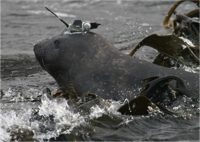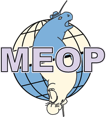
Over 800,000 vertical profiles of Temperature and Salinity have been collected since 2004 in the World Ocean by attaching tags on marine mammals, such as Southern elephant seals.
In this website, you will find information about the marine mammal tagging programs, and an access point to the publicly available databases.
Please let us know if you are using our data. You can contact us by mail to info@meop.net if you have any question.
The MEOP data portal
Content of the website
Germany

Deployment sites
• Southern Ocean Indian Sector: Marion Island (more information on the South Africa group page)
• Southern Ocean Atlantic Sector: King George Island / Isla 25 de Mayo
• Southern Ocean Atlantic Sector: Atka Bay, Drescher Inlet, Filchner Trough
Supporting institutions
• Alfred-Wegener-Institut Helmholtz-Zentrum für Polar- und Meeresforschung, Bremerhaven, Germany
• South African National Antarctic Programme, University of Pretoria, South Africa
• Dirección Nacional del Antártico, Instituto Antártico Argentino, Buenos Aires, Argentina
Supporting institutions
• Alfred-Wegener-Institut Helmholtz-Zentrum für Polar- und Meeresforschung, Bremerhaven, Germany
• South African National Antarctic Programme, University of Pretoria, South Africa
• Dirección Nacional del Antártico, Instituto Antártico Argentino, Buenos Aires, Argentina
Actors/people involved
• Horst Bornemann, Michael Schröder, Joachim Plötz (Alfred Wegener Institute)
• Nico De Bruyn, Trevor McIntyre, Chris Oosthuizen, Ryan R. Reisinger, Cheryl A. Tosh, Marthán N. Bester (University of Pretoria) (more information on the South Africa page)
• María E. I. Márquez, Jorge A. Mennucci (Instituto Antártico Argentino), Gustavo A. Daneri (Museo Argentino de Ciencias Naturales "Bernardino Rivadavia")
Deployments at Marion Island were done in collaboration with South Africa. Two of those deployments (ct35x, ct73) are co-owned by both groups and presented on the South Africa group page. A further two deployments (ct54, ct102) were collaboratively done at King George Island (presented here). The associated data is co-owned by the two groups. See also the South Africa group page.
Presentation of the group:
Seal-borne oceanographic data are attributed to the project Marine Mammal Tracking (MMT). MMT is a collaborative project of seal ecologists at the Bentho-Pelagic Processes Section of the Alfred-Wegener-Institut Helmholtz-Zentrum für Polar- und Meeresforschung, Bremerhaven, Germany, and the Mammal Research Institute, University of Pretoria, South Africa. The collaboration involves the Instituto Antártico Argentino, Buenos Aires, Argentina, the National Institute of Polar Research, Tokyo, Japan, and the University of New South Wales, Evolution & Ecology Research Centre, School of Biological, Earth and Environmental Science, Sydney, Australia. We developed and initiated a joint and coherent collaborative research approach, which aims to compare the foraging behaviour of seals of different areas in relation to physical oceanography and in the context of climate change. MEOP data within MMT focus on Weddell and southern elephant seals. Validated post-processed data are provided via the MEOP portal. Primary data and related meta-information are available in open access (OA) via the Data Publisher for Earth & Environmental Science (PANGAEA).

